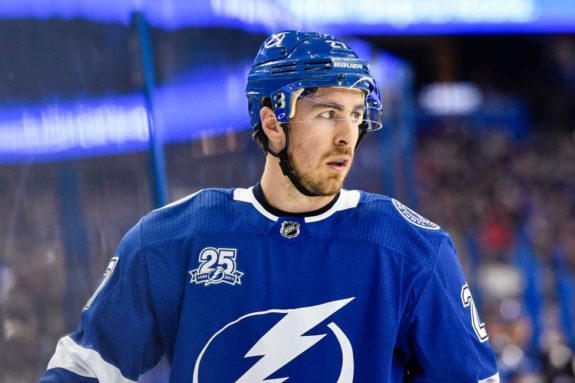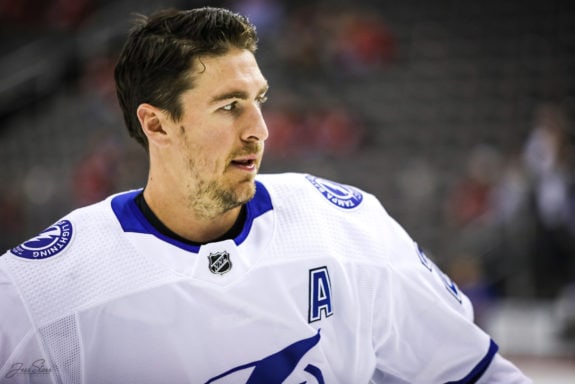As we start to discuss the rosters for the Olympic teams for the upcoming 2022 Winter Olympics, the focus here will be on the defensive group that Team USA decides to take with them. There are a lot of new faces that will push out the old, but Ryan McDonagh should be one of the two defencemen that makes a return after eight long years. The other is John Carlson.
McDonagh’s experience, winning pedigree, two-way and defensive play make him a lock to be one of the members on Team USA’s Olympic roster.
McDonagh Brings Experience & Winning Pedigree
McDonagh would be the oldest defenceman on the team, bringing with him experience not only on the international stage but also when it comes to meaningful games. He has been a part of the Tampa Bay Lightning who have gone back-to-back as Stanley Cup champions. Both years, he has been a key piece on the force that is the defence of the team. As they say, offence wins games, defence wins championships. That’s exactly what he has helped build in Tampa Bay.

The round-robin of the Olympics may relate more to the regular season in the NHL, but when the quarterfinals, semi-finals, and the final is here, that’s when games tighten up like they do in playoffs and it becomes even more competitive. As the games tighten up and become more physical and tight-checking, defence becomes a huge factor in the outcomes of games.
Though McDonagh hasn’t had the most success during international play throughout his career, he does have that experience playing every type of international competition, especially the one that matters the most: the Olympic Games. He hasn’t played internationally since 2016 due to competing for the Stanley Cup and COVID-19, but he has been a part of Team USA in the IIHF U18 World Championship, IIHF World Junior Championship, Ice Hockey World Championships, World Cup of Hockey, and the 2014 Olympics. He and Team USA will be looking for a better result than fourth in this tournament.
McDonagh’s Defensive Side of the Game
What most other candidates don’t bring to the table, McDonagh excels at, setting himself apart from most of the other defencemen and raising his value. He is a go-to defenceman on any penalty-killing unit, as only Brandon Carlo has more time on the penalty kill per game among active American defencemen, by one second. Not only does he also provide consistency, but he would also provide leadership to a younger team.
McDonagh can eat minutes, as he has averaged over 23 minutes a night throughout his career, and that includes his 18:44 average time on ice (ATOI) in his rookie season bringing that total down. On the penalty kill alone, he is on the ice for 2:47 minutes a game. Six of the 12 seasons in the NHL, he has received Norris Trophy votes, the highest he’s placed being eighth in 2013-14 and 2018-19.
He is a career plus-200, plus-78 higher than the next closest active American defenceman. That doesn’t only speak to his defensive responsibilities, but also the offensive capabilities that he could provide. On top of that, he has averaged 1.99 blocks per game in his career and 1.22 hits per game. Both of these shouldn’t be taken lightly, as it is a big part of keeping the puck away and out of his team’s net.
You may also like:
- Projected Lineups for the Lightning vs Kings – 1/4/25
- The 2012 Maple Leafs – Lightning Blockbuster Trade That Wasn’t
- Tampa Bay Lightning Expected to Host Outdoor Game Next Season
- Tampa Bay Lightning’s 5 Best Defensive Players This Season
- Sharks Beat Lightning 2-1 Behind Askarov’s Big Saves
Who Would McDonagh Compete With for a Spot on the Team?
The eight defencemen that are highly believed to fill up the spots on the back end for Team USA are as follows: Charlie McAvoy, Adam Fox, Seth Jones, Zach Werenski, Quinn Hughes, John Carlson, Jaccob Slavin, and McDonagh. (from “Projecting the 2022 U.S. Olympic men’s hockey roster”, NBC Sports, Sept. 3, 2021) There would be a lot to figure out in the time leading up to the Olympics, like the defensive pairings and who would play in what situation or which games.
Whoever performs well should more than likely play in the bigger games as the tournament progresses, but McDonagh should get the call more later at the very least to match up against the high-flying Team Canada in their division. His two-way game and abilities defensively would come in handy more in shutting down the opposing players rather than adding a ton of more offence, which the forward group for Team USA doesn’t particularly need. Though McDonagh does add offence to his game, he is more known for solid play defensively and the offence should be left to the likes of Fox, Werenski, and Jones.

Some players that will be left off the team would be former 2014 Olympic teammates Ryan Suter and Cam Fowler. Suter is past his prime and when matched up, McDonagh brings more to the table in areas Team USA would be looking for than Fowler, though he may still be invited to try out. Jeff Petry would have been an option if this was any time over the past two seasons, but he has fallen off and may not even get the call.
Other defencemen that should be left off the roster are Kevin Shattenkirk, Torey Krug, Justin Faulk, and Tony DeAngelo. All of these players have more of an offensive mindset, which will cause them to compete with the highly skilled offensive defencemen already projected to have spots locked down.
Though McDonagh will have some tough competition to beat out for a spot on the American Olympic team, everything he brings to the table boosts his overall value to be a great all-around option. Even if he doesn’t get to play in every game, his style of play will be very beneficial to slow down top teams and give his team a better shot at winning.